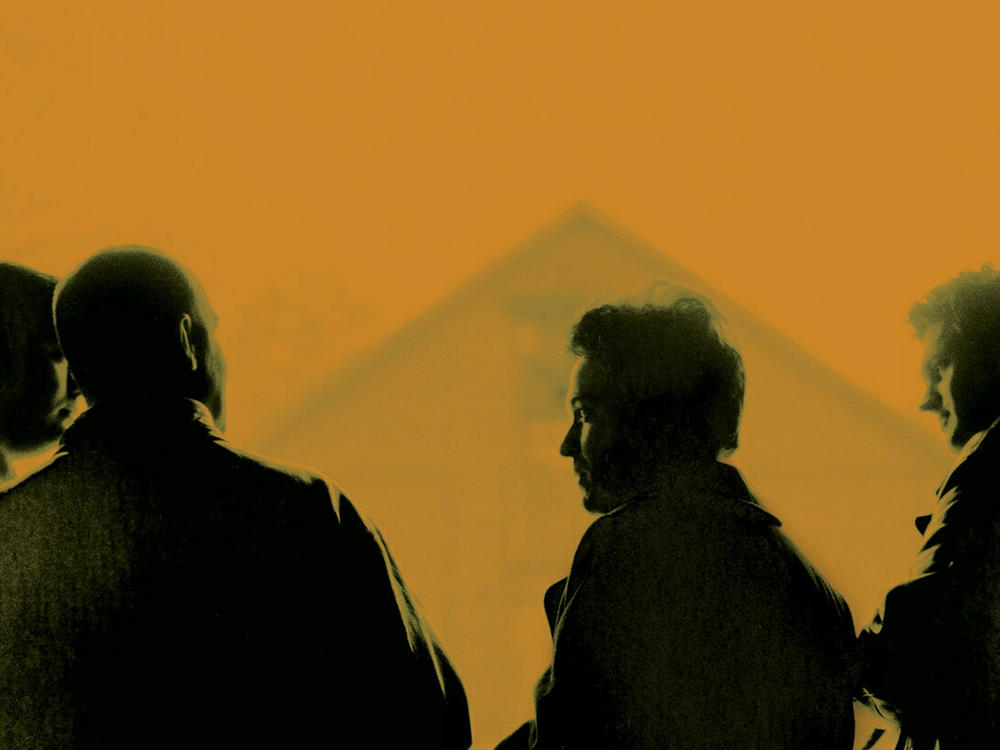Section Branding
Header Content
At 25, Pernice Brothers' debut throws even brighter sparks — and darker shadows
Primary Content
A Joe Pernice song wants you to live inside its moment. "Bitter gold" moonlight, corporate ladders "made of concrete and the bones of people," chicken wire in the corner of a garage filling with car exhaust — these are some of the scenes found on Overcome by Happiness, the 1998 debut by his band Pernice Brothers. How considerate, then, that these sad, smart and darkly funny portraits swim in a champagne of sound, cascading down a pyramid of crystal glasses even as the lives portrayed seem to drown in a dive bar.
This was the aesthetic Pernice came into seemingly fully formed, but which had actually been cultivated in the back of his mind while in his previous band. If he sang melancholy country tunes with the Scud Mountain Boys throughout the '90s, the Pernice Brothers leaned hard into two-dollar chord changes, deceptively simple pop song structures, orchestral arrangements and an airiness laden with missed opportunities and lost potential. "Do you think you might scrape your life together / Just in time to find you've got no peace of mind," Pernice sings on the lounging yet buoyant title track, only for swings to swoop into the punchline: "When everybody wants a piece of your pretty white ass." In his breathy delivery, a sarcastic smirk never sounded so sweet.
Pernice brought about Scud Mountain Boys' demise in order to realize his new vision. Everything about Pernice Brothers was deeply uncool, but also wore its purposefully pretentious ambience as a badge of honor: Pernice's recently acquired MFA in creative writing from UMass informed an exacting sense of prose; the band's musical references included Harry Nilsson, Bee Gees and Burt Bacharach. While artists across the pond like Saint Etienne, Portishead and Belle & Sebastian explored the possibilities of pop music, there was a sense from Americans in the late '90s that Bacharach's Brill Building opulence was verboten and corny. In fact, those lush landscapes were just right for the complex vulnerability emerging from the likes of Pernice, Jim O'Rourke and A.C. Newman's pre-New Pornographers band Zumpano. This, in an era of emotionally stunted macho men on rock radio, was the sophisticated pop music Pernice wanted to make.
For its 25th anniversary, New West Records has reissued and remastered Overcome by Happiness (originally released on Sub Pop) on vinyl. The deluxe edition — a book of photos and thoughtful liner notes by critic Stephen Deusner and Pernice himself, plus a second LP of singles and previously unreleased demos — comes handsomely packaged like a tall, dark someone with day-old stubble in a parka jacket.
In those demos, captured intimately on a Tascam four-track cassette recorder at home or on an ADAT machine after hours at a music store, one can hear how the eventual studio arrangements simultaneously illuminated and cloaked intention. Most of them are just Pernice's voice, an acoustic guitar and the persistent hiss of tape, and yet as far as a signature sound goes, it's pretty much all here: clear-eyed melody, stutter-and-release strum patterns and chord progressions, clever and often biting turns of phrase. The title track's demo aches more without the sweeping release of strings. Clustered open chords make the troubled lives of "Dimmest Star'' uncomfortably claustrophobic. "Clear Spot'' gets an uncertain chord change and filler doot doo doo's in a demo that Pernice says came to him walking down Main Street in Northampton, Mass., the rollicking final version reduced to shadows and uncertainty. There are early versions of songs that would appear on later releases ("Courage Up" would end up on Chappaquiddick Skyline's self-titled record and "Let That Show" on The World Won't End), but there's also the charming late-night strummer "Song #2 (The Queen of NYC)," appearing for the first time anywhere.
When I played Overcome by Happiness in our living room recently, my 4-year-old asked about the opener: "Is this song about superheroes?" It was a funny question, but, as is often the case with childlike experience, oddly intuitive. "Oh, I need somebody / Who won't see through me / Was happy living a lie," Pernice sings on "Crestfallen." If you squint, you can see the superhero behind the disguise, yearning for recognition but also ashamed of what's beneath. Joe Pernice is not a superhero — perhaps emphatically so — but he does hide a middle space of emotion in plain sight, resplendent in wrought-iron arrangements that don't make us forget, but extend the feeling.
Copyright 2023 NPR. To see more, visit https://www.npr.org.

